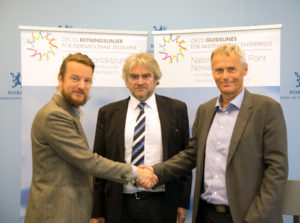Today, FIVAS and Norconsult signed a joint statement to minimise the adverse impacts of major hydropower projects on indigenous groups and the environment.
The agreement was signed following mediation by the Norwegian National Contact Point (NCP) for the OECD Guidelines for Multinational Enterprises.
The Norwegian Association for International Water Studies (FIVAS) filed a complaint against Norconsult concerning its involvement in hydropower projects in Sarawak in Malaysia. In the complaint, FIVAS claimed that Norconsult’s activities in Malaysia violate the OECD Guidelines. Norconsult rejected these claims. Now, the parties have agreed on a joint statement that highlights the importance of human rights due diligence and transparency.
The Murum and Baram projects in Sarawak
The hydropower projects Murum and Baram is part of the Sarawak Corridor of Renewable Energy (SCORE)-programme that the state of Malaysia has initiated. The company Sarawak Energy Berhad (SEB) is responsible for the hydropower project Murum and Baram. Through its wholly owned subsidiary Norpower, Norconsult has established a business relationship with SEB by entering into a framework agreement as technical adviser. Indigenous groups are affected by the hydropower projects. Part of the local population has had to move as a consequence of the Murum Dam and many risk being displaced if the construction of the Baram Dam is approved. The complaint raises the question of what the OECD Guidelines require as regards consultations with affected indigenous people and mitigating measures. Norconsult, via its subsidiary company NorPower, has a minor role as technical adviser in the Murum and Baram projects. According to the OECD Guidelines, however, responsibility also applies to consultancy companies that through their business associates are linked to projects where there is a risk of human rights violations.
‘We recognise that the hydropower development in Malaysia entails an inherent risk of violations of indigenous people’s rights. We regularly discuss concerns raised by civil society and other stakeholders with the management of SEB with a mutual view to preventing or mitigating the negative social and environmental impacts of the projects,’ says Per Kristian Jacobsen, CEO of Norconsult.
‘We are content that we were able to maintain a constructive dialogue with FIVAS in this process and we are prepared to continue the dialogue based on mutual trust, if FIVAS has any questions related to our business activity in the future, he says.
FIVAS acknowledges that Norconsult takes the situation in Sarawak seriously.
‘We agree with Norconsult that consultancy companies must do continuous assessments on the effect projects may have on human rights. We are pleased that the company will start carrying out human rights due diligence says Jonas Holmqvist, Director at FIVAS.
He underlines how important the agreement is.
‘We are particularly pleased that Norconsult recognises that indigenous people are particularly vulnerable in the development of hydropower plants and that indigenous people’s rights must be taken into account in consultancy processes. We are also pleased that Norconsult will be more open on how they will incorporate this perspective in their future risk assessments’, says Holmquist.
Among other things, the joint statement describes that Norconsult respects indigenous people’s rights in accordance with ILO Convention 169 and the UN Declaration on the Rights of Indigenous Peoples (UNDRIP). Furthermore, Norconsult will carry out human rights due diligence reviews, sustainability reporting (GRI), and make sure that the Group’s Code of Ethics and governing documents are in compliance with the OECD Guidelines.
There is agreement that claims were made in the complaint that have been refuted. The parties also agree that future contact shall be based on mutual trust and a clarification of facts.
Successful mediation
The complaint was submitted in August 2014. After the NCP published its initial assessment of the specific instance in January and subsequent meetings were held about the framework conditions for mediation, the parties got together at the end of April and were offered mediation.
‘The parties have participated in an important process to resolve disputes about enterprises’ responsibility for human rights and environmental considerations,’ says Chair of the NCP, Ola Mestad.
The Norwegian Contact Point for the OECD Guidelines
The OECD Guidelines are recommendations on how enterprises engaged in international trade and production are to handle, among other things, human rights and environmental considerations. All OECD countries are obliged to have national contact points to deal with allegations of non-compliance with the OECD Guidelines. FIVAS wanted the Norwegian NCP to consider the complaint because FIVAS meant that Norconsult had not performed sufficient human rights due diligence in its operations in Malaysia.
The NCP is not a legal body, but it can assess whether an enterprise has complied with the Guidelines for Responsible Business Conduct. The NCP is funded by and is under the administrative authority of the Ministry of Foreign Affairs, but it operates independent of the Government.
NCP chair Ola Mestad states that this shows that the OECD Guidelines are a useful tool for Norwegian enterprises’ work on corporate social responsibility.
‘It is particularly important that Norconsult will review its procedures to prevent possible human rights violations also in future projects, even though it plays a minor role as a consultant with limited influence on the project itself,’ says Mestad.

Read the Joint Statement here.
